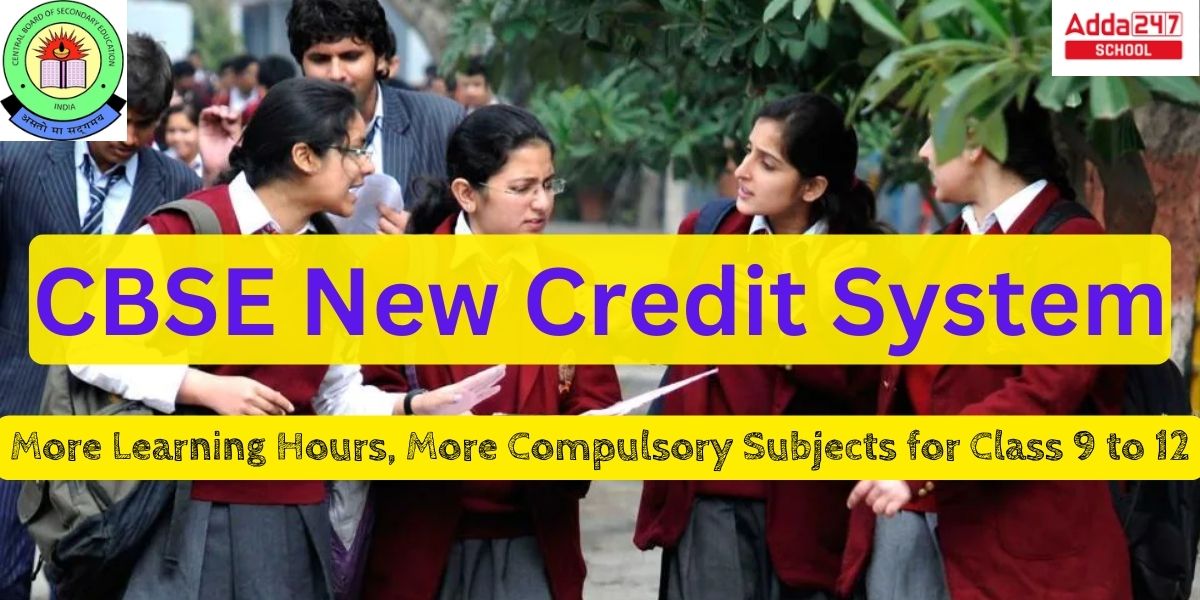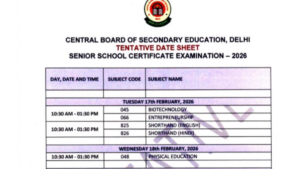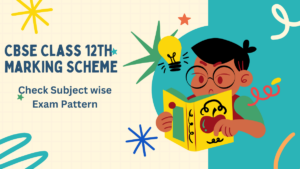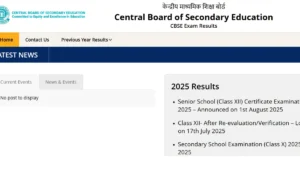The Central Board of Secondary Education has proposed sweeping changes in the academic framework for classes 9 to 12 of the CBSE board. In line with the National Education Policy (NEP 2020), the CBSE is scheduled to notify any modifications to the credit system. The number of required subjects and learning hours has been raised following the proposed recommendations. By December 5, 2023, all CBSE schools were required to study the National Credit Framework, which was created by the UGC to give students flexibility and mobility and to submit changes.
CBSE Credit System
The CBSE credit system for classes 9 to 12 is all set to undergo significant changes in the upcoming academic session. As part of its effort to implement creditization, the Central Board of Secondary Education (CBSE) has suggested significant modifications to the curricular structure for Classes 9 through 12 in accordance with the National Education Policy (NEP) 2020. The National Curriculum Framework (NCrF), which the UGC adopted in 2022, serves as the foundation for the new credit system.
The proposal drafted by the CBSE read, ” The NCrF guidelines for schools focuses on developing conceptual understanding and critical skills among students. For this purpose, school education is imagined as a flexible, multi-disciplinary endeavour, rooted in the country’s ethos that would create self-sufficient learners capable of meeting the challenges of the 21st century”.
Objective of the CBSE New Credit System
Establishing academic comparability between general education and vocational education is the goal of the new credit system, which will facilitate seamless transfers between the two educational programs. The draft guidelines proposed by the CBSE for this purpose is open for feedback from all the schools. Students from classes 9 and 10 will have to pass 10 subjects from the existing 5 subjects. Students will have to study three language subjects (at least two Indian).
Check: CBSE Date Sheet 2024
Proposed CBSE Credit System: Key Features
Parents and students can review some of the main components of the new CBSE-proposed credit system for all connected schools.
Credits: Each topic will be given a specific number of credits based on the amount of study time it required. A full academic year is equivalent to 1200 notional study hours or 40 credits.
Learning Hours: The number of hours a student would need to devote to a specific subject in order to meet the learning objectives for that subject is known as the “notional learning hours.” Both in-class and outside-of-class learning would fall under this. The allotted hours cover experiential learning that occurs outside of the classroom as well as intellectual study.
Flexibility: Under the credit system, students would be allowed to select the courses they want to take and plan out their study sessions. Students will have the freedom to choose more subjects to study and to repeat those they find enjoyable.
Grading: Students would still receive an A–E grade, but their grades would now be based on how they placed in the class relative to one another. The top one-eighth of the students would receive an A1 grade, followed by an A2 for the next one-eighth, and so on. It will help equalize the demographic and development factors among different schools.
Holistic Development: Another way the credit system would emphasize holistic development is by including credits for extracurricular activities such as community service, sports, and the arts.
CBSE Credit System for Class 9 and 10
The latest changes that have been proposed in the academic framework of the CBSE class 9 and CBSE class 10 as per the new credit system is discussed by taking the reference point of the learning hours and total subjects.
Learning Hours
- Under the new credit system, 1,200 hours of overall learning have been added, up from 1,050 hours currently.
- Three languages and multidisciplinary subjects like environmental education have been given 120 hours apiece.
- Additionally, 150 hours have been set aside for math and computational thinking, social science, science, and vocational education
- 60 hours have been set aside for art education, physical education, and overall well-being.
- A student may obtain 40 credits if they pass in ten topics during classes nine and ten.
Compulsory Subjects
In order to be considered passable, currently students in Classes 9 through 10 must pass five subjects, comprising two language courses and three other subjects. The proposed draft for the CBSE new credit system stipulates that students must pass in 10 subjects, seven disciplines and three languages, at least two of which must be native to India. To be deemed pass, students must pass each of the ten subjects. The seven subjects are: science, social science, art education, physical education and well-being, mathematics and computational thinking, vocational education, and interdisciplinary areas.
CBSE New Credit System for Class 11 and 12
For a student in class 11 and CBSE class 12, to receive 40 credits, they must study and pass six subjects, two of which are languages. 180 hours have been set aside for two languages, one of which must be an Indian native language, and 210 hours have been set up for four subjects. A total of 47 credits will be awarded to those who pass seven subjects. It is optional to choose the fifth subject.
In accordance with the suggested system, grades will also be given to students in each academic subject. The passing students’ grades will be awarded in rank order, from A1 to D2. Those who receive an E will be classified as “essential repeat.” The details of the credits and learning hours proposed for different subjects is listed hereunder.
| Compulsory subjects | Hours | Credits |
| Subject 1- Language 1 | 180 | 6 |
| Subject 2- Language 2 | 180 | 6 |
| Subject 3 | 210 | 7 |
| Subject 4 | 210 | 7 |
| Subject 5 | 210 | 7 |
| Subject 6 | 210 | 7 |
| Optional Subject 7 | 210 | 7 |
| Total | 1,200 | 40-47 |
CBSE Credit System Implementation Schedule
The date of the new credit system’s adoption has not yet been made clear by CBSE. Reports indicate that this program might, nevertheless, begin in the upcoming academic session (2024-25). There will be five courses in classes 9 and 10, with two language classes at seven credits each, two credits for physical education, and one credit for art education.
As per the new credit system of the CBSE, classes 11 and 12 will each receive six credits for language courses and seven credits for other topics, for a total of forty credits. Students are recommended to check the official CBSE website for additional updates.












 CBSE Class 12 Date Sheet 2026 Released, ...
CBSE Class 12 Date Sheet 2026 Released, ...
 CBSE Class 12th Marking Scheme 2026, Che...
CBSE Class 12th Marking Scheme 2026, Che...
 CBSE Class 10 Compartment Result 2025 Li...
CBSE Class 10 Compartment Result 2025 Li...














